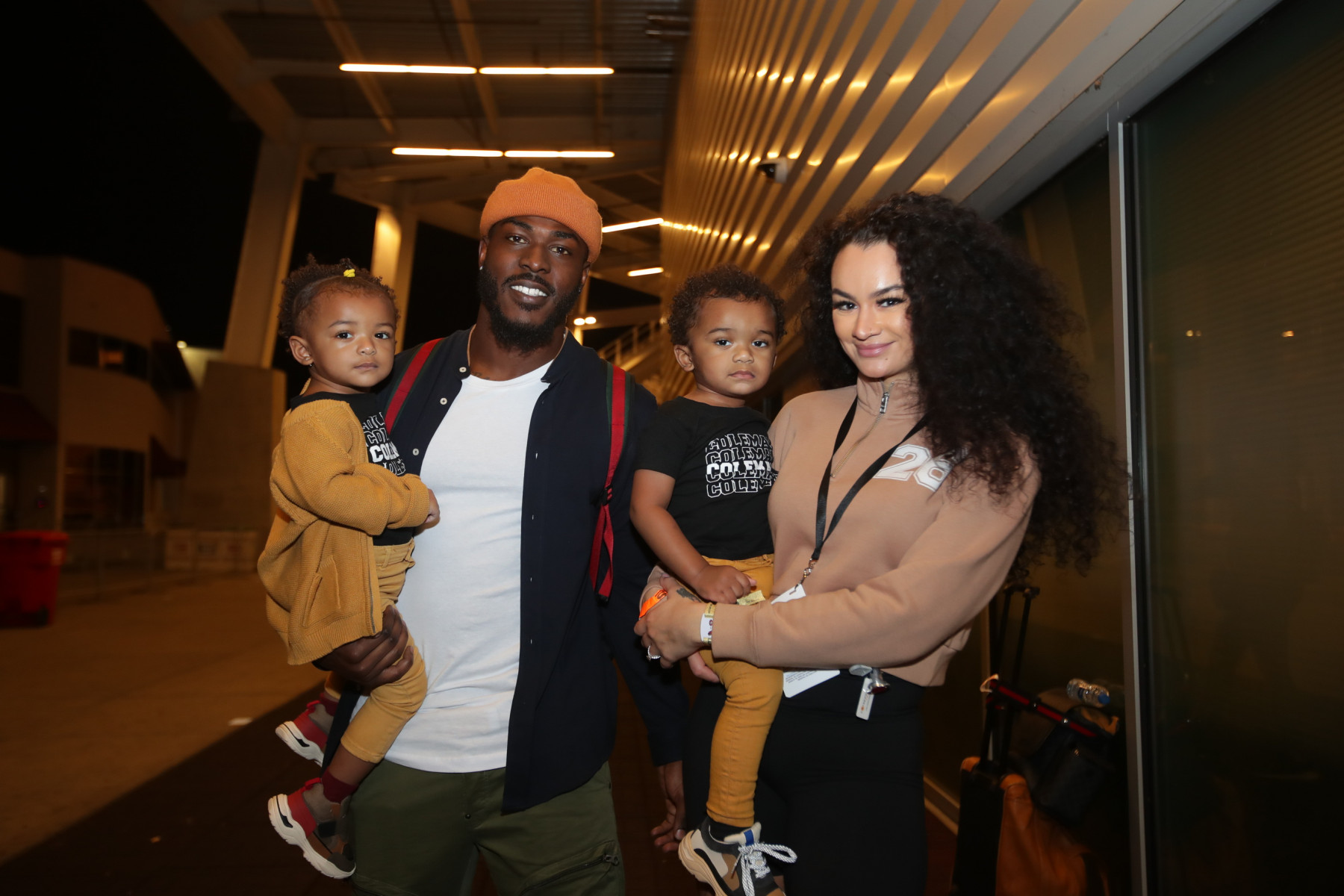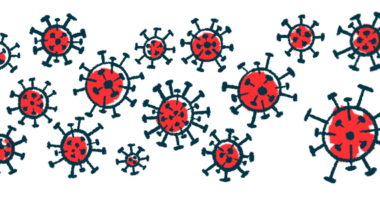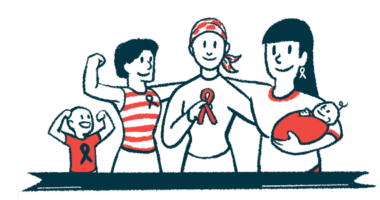NFL Player Tackles Sickle Cell Disease for His Daughter

Tevin and Akilah Coleman with their daughter, Nazaneen, and son, Nezerah (Courtesy of Tevin Coleman)
Tevin Coleman brought the snow inside last winter.
Coleman, a running back for the New York Jets, his wife Akilah Coleman, and twins celebrated Christmas in January, to accommodate the last few weeks of the NFL regular season.
His daughter, Nazaneen, 4, has sickle cell disease, and cold weather can aggravate her symptoms. But Coleman, 29, wanted her to know the joy of a snowball fight. So, he brought some of the snow from their Atlanta yard into their warm living room and the festivities commenced.

Tevin Coleman with his daughter Nazaneen, who has sickle cell disease. (Courtesy of Tevin Coleman)
Speaking out about sickle cell
For Coleman, that’s part of the reality of balancing Nazaneen’s sickle cell disease with her being a 4-year-old. He and Akilah are focused on preventing a pain crisis and hospital visit even as they strive to let Nazaneen simply be a child and focus on what she loves doing.
“Whatever it is, we can do it. She’s in gymnastics. That’s something some would frown upon with sickle cell. She likes to swim,” Akilah Coleman, 30, said in a video interview with Sickle Cell Disease News. “We find ways around it, meaning we make sure that she has layers and make sure she’s hydrated and make sure she’s comfortable.”
The Colemans have been sharing their story through a paid partnership with Global Blood Therapeutic’s (GBT) Sickle Cell Speaks program. The website features patient narratives along with information about how to manage sickle cell-related care.
By sharing their own experience with sickle cell disease and sickle cell trait, the Colemans hope to communicate to their daughter that they are rooting for her success and well-being.
“By us using this platform, I think it just shows like, hey, we did this because we believe in you,” Akilah Coleman said. “It won’t be an easy road, but guess what? We’re here with you, and we believe in you, and we will be your advocates every step of the way.”
Having a sickle cell trait means the patient has one sickle cell gene and another gene that is functioning normally. Even without having sickle cell disease, those with the trait can have symptoms such as pain crises.
If both parents have the trait, there’s a 25% chance their children will have sickle cell disease and a 50% chance their children will have the trait. The disease is more prevalent among African Americans, with the trait occurring in one of every 13 births and the disease occurring in one of 365 births.
Family matters
Both Tevin and Akilah Coleman have the sickle cell trait. Tevin Coleman learned he had the trait in college and found himself unable to finish practices at Indiana University because his body kept cramping. A blood test revealed the trait and, once he understood what was happening, a combination of rest, eating well, and communicating with doctors and coaches allowed him to manage his symptoms.
Akilah Coleman was not as directly affected, though her mom had always told her she had the trait. She hopes to raise awareness about rare diseases and about the unique health situation of those who have sickle cell disease or its trait.
Nazaneen and her twin brother, Nezerah, were born Nov. 25, 2017. Nazaneen was underweight and things didn’t seem right, her mother said. She was diagnosed with sickle cell disease at 6 months. Her brother also carries the sickle cell trait.
One of the most difficult times for the family came last July when Nazaneen was admitted to the hospital with acute chest syndrome. It’s a common complication of sickle cell disease and Nazaneen has already had more than 100 hospital visits related to sickle cell. It can lead to chest pain, cough, fever, low oxygen levels, and substance accumulation in the lungs.
“That was hard for me, just being away from her,” Coleman said. “Just seeing that and knowing that she’s in pain, and I can’t be there to protect her.”
Nazaneen’s parents are acutely aware of her needs and encourage her to communicate how she feels without revealing too much to her about her own condition. They turn it into a game of sorts.
“We just tickled her all over her body and say is this an ouchie?” Akilah Coleman said. “And there have been times there have been ouchies and we’re like, OK, I’m gonna give a little bit more attention to that.”
The pair are also aware that Nazaneen needs more rest. Tevin and Akilah Coleman call it her “beauty sleep.”
Akilah Coleman also learned from Nazaneen’s doctor to check her spleen as a way to monitor her health. Nazeneen’s parents also ensure her hands and feet stay warm and that she gets enough water.

Akilah and Tevin Coleman with their daughter, Nazaneen, and son, Nezerah. (Courtesy of Tevin Coleman)
Even her twin brother will offer her water. Their parents say the twins communicate almost telepathically and Nezerah can easily tell when his sister is in pain.
Now that Nazaneen is in preschool, the Colemans have begun to give advice to parents of children with sickle cell disease on how to communicate with teachers and staff about their experiences.
Akilah Coleman said she is setting the stage for advocating for her child so that Nazaneen is confident even if she is bullied because of her needs.
“What we’re just trying to do is set that tone,” Akilah Coleman said. “So, when that comes about she can live her life confidently and know that she is beautiful, and intelligent, and she’s talented, and she can offer just as much to the world as a normal person walking around without a single issue.”
Sharing their personal lives through Sickle Cell Speaks was not something the couple took lightly and they interviewed a handful of organizations before landing on GBT’s program. They felt it was important to share their story to control their own narrative and show that life isn’t over because of sickle cell disease.
“When I was growing up, I never heard anything else, it was always very negative,” Akilah said. “And it just seemed like the end of the road, it just seemed like there was just nothing you could do.”
Communication is key
As Tevin Coleman has opened up about his own journey with the sickle cell trait, he’s been able to give advice to other players in the NFL who have the trait.
“Communication is the big key,” Coleman said. “If I didn’t communicate with any of my coaches, or the doctors, in my college, I would have still been going through those symptoms.”
On the day before World Sickle Cell Awareness Day, June 19, Coleman flew back from football practice to be with his daughter and have some much-needed family time on Father’s Day.
It was a “day we were able to spend together as a family,” Akilah Coleman said. “We just enjoyed that moment.”








